Is TruthFinder a Scam?
Laura Martisiute
Reading time: 6 minutes

Table of Contents
If you’re thinking of using TruthFinder, you need to know: Is TruthFinder a scam?
Below, we explain whether TruthFinder is a scam and discuss some steps you can take to improve your safety when using this online platform.
What Is TruthFinder?
TruthFinder is a people search site founded in 2015 by Kris Kibak and Joey Rocco. It is owned by PeopleConnect Holdings Inc.
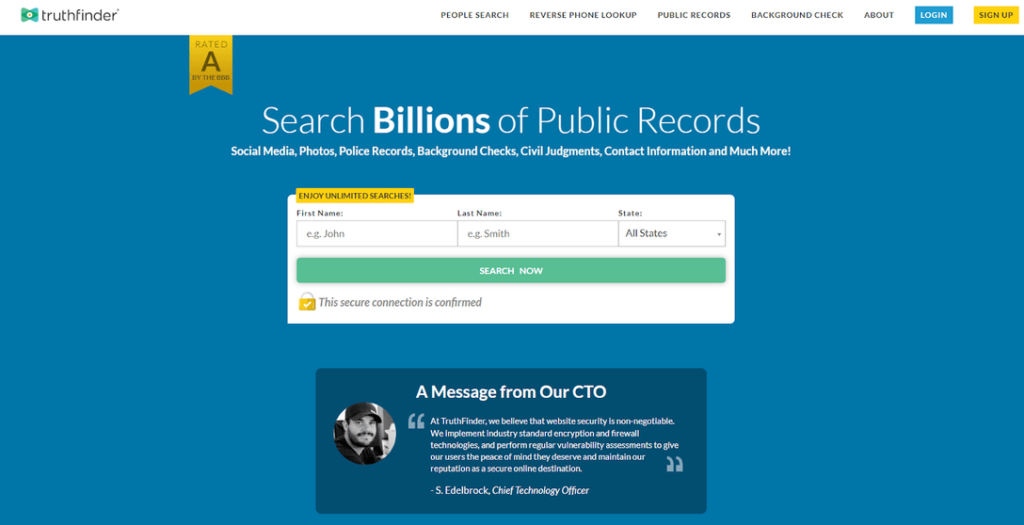
The site provides background checks and reverse address, email, and phone lookups. Anyone can use TruthFinder to access public records and personal information quickly.
A typical TruthFinder report contains a lot of information, from a person’s full name and employment history to possible relationships, images, and traffic records.
TruthFinder is not free, i.e., you have to pay a monthly subscription fee to view people’s reports on the TruthFinder site.
TruthFinder has an opt-out option for people who wish to remove their data from the platform (you can see our step-by-step TruthFinder opt-out guide here).
Is TruthFinder a Scam?
No, TruthFinder is not a scam. It’s a legitimate people search site.
It collects people’s personal information from various sources (public records, social media, etc.), collates it into reports, and shares these reports (with people’s personal information) with anyone who wants them (for a fee).
TruthFinder reports are organized into the following sections:
- Report summary. Key data points from the report.
- Timeline. Report highlights in chronological order, from the person’s date of birth to their most recent information.
- Personal info. Full names, aliases, age, education and employment history, possible relatives, possible associates and relationships, and possible images.
- Contact info. Phone numbers and email addresses.
- Location history. Current and past residences and places of work.
- Criminal and traffic record. Including the charges or offense, offense date, record source, and any other information. Plus, any watchlists the person may be on.
- Sex offender info. Names, offenses, and locations of individuals who have a recorded history of sex crimes living near the locations associated with the person you’re looking up.
- Social profiles. Any online profiles the person may have, like Facebook, X, Amazon, etc.
- Business profiles. Possible business affiliations, corporate filings, and trademarks.
- Licenses. Possible licenses, including professional licenses and weapons permits.
- Finances. Financial history and background, like bankruptcies, liens, etc.
- Assets. Possible properties, vehicles, aircraft, and watercraft owned.
You can see an example of a TruthFinder report here.
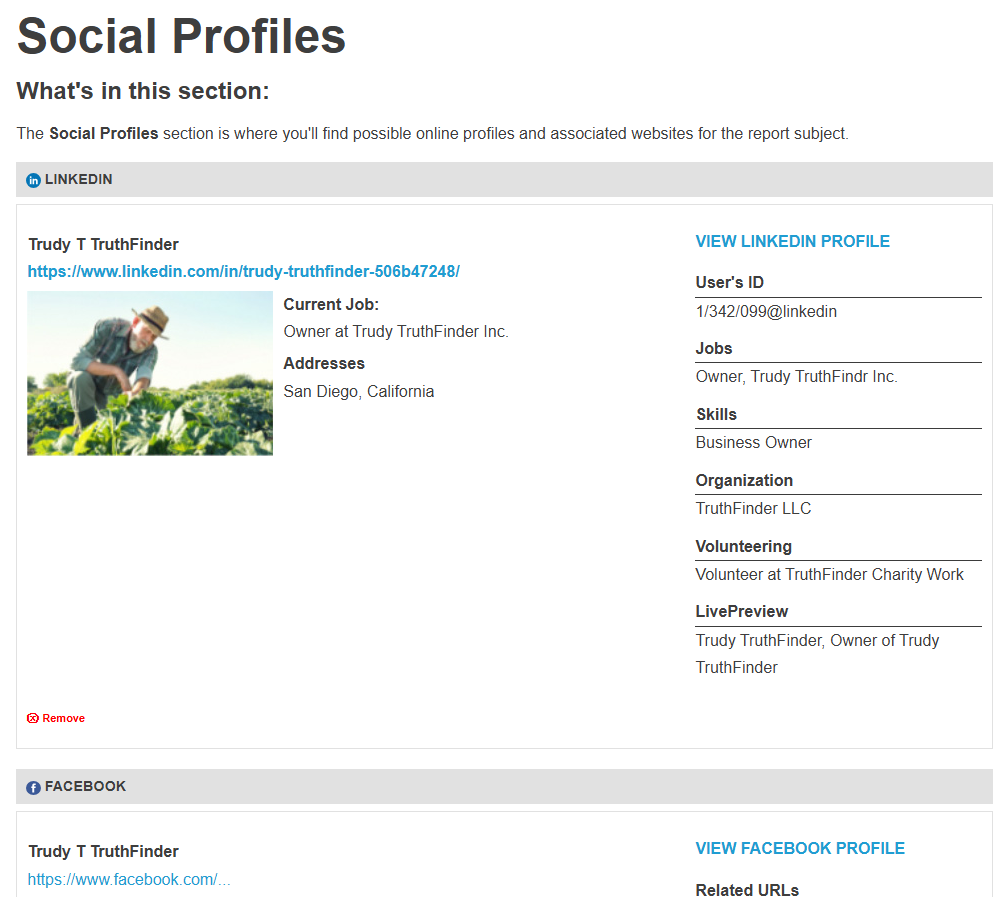
TruthFinder can feel like a scam due to the language it uses, e.g., “Learning the truth about the history of your family and friends can be shocking, so please be cautious when using this tool.”
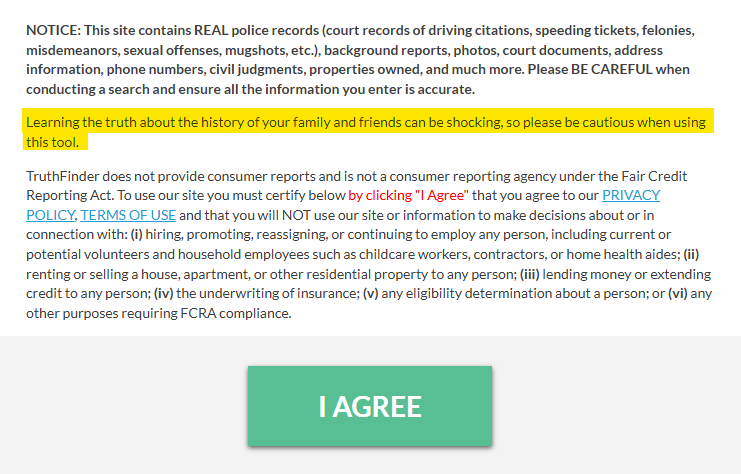
The way it conducts searches (by making you wait for a few minutes as it “searches” for information) makes it feel like a scam as well.
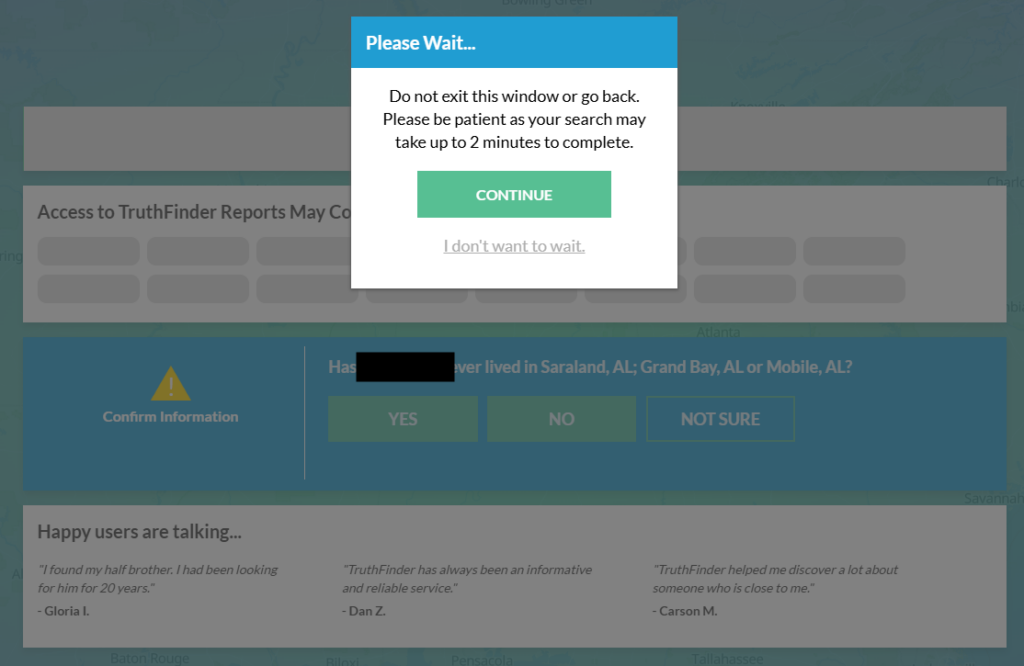
However, once the search is done, you are given access to a person’s report – though you must first pay for it.
That said, the accuracy of information within people search reports, including TruthFinder, tends to vary. According to one report, 40% of the information people search sites and data brokers have on people is inaccurate or no longer accurate.
Since TruthFinder is not compliant with the Fair Credit Reporting Act, it can’t be used to make decisions about insurance, consumer credit, tenant screening, employment, etc.
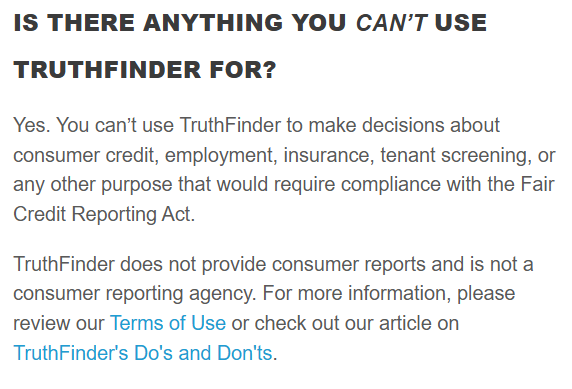
Security
TruthFinder secures connections to its website with 256-bit encryption.
In its privacy policy, it says it uses “reasonable security measures” to protect users’ data, but does not go into detail as to what these measures are (however, that is standard practice).

When you pay for TruthFinder, your credit card information is not stored on TruthFinder systems but rather with TruthFinder’s PCI-certified partners.
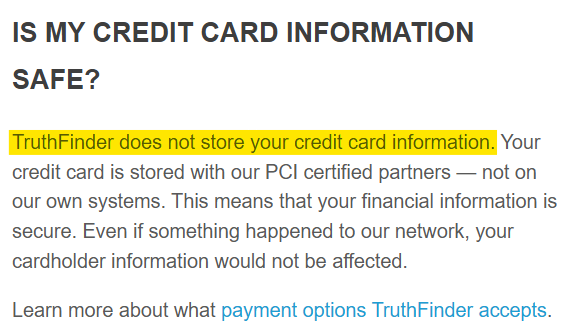
Even though TruthFinder is not technically a scam (i.e., it does what it says), it can put you at risk of scams. Criminals and other bad actors use people search sites for scams, phishing emails and texts, identity theft, and other attacks.
The personal information within people search sites can also be used for harassment, doxxing, stalking, and other threats (as has happened, according to Better Business Bureau complaints).
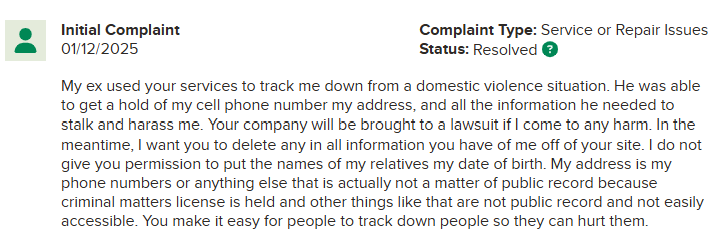
As a result, it’s recommended to opt out of people search sites. Just remember to recheck these sites periodically, even if you think you’ve removed yourself from them, as they can relist people when they find more of their information online.
See our TruthFinder opt-out guide for step-by-step instructions on how to opt out. Or, subscribe to DeleteMe – our privacy experts will remove your personal information from these sites on your behalf.
Privacy
TruthFinder searches are anonymous, meaning the person you’re looking up will not know you’ve done so.
In its privacy policy, TruthFinder details the kind of data it collects (e.g., name, address, email address, account or credit card number, age, zip code, IP address, etc.), what it does with it (mainly to maintain its site and services), and who it shares it with (e.g., affiliated companies, third-party service providers, law enforcement officers, etc.)
So, Should You Use TruthFinder?
That depends entirely on you.
If you do use TruthFinder, keep in mind that reports can contain outdated or incorrect data.
Also, remember that just like you can use TruthFinder to find out someone’s personal information, others can do the same to you (unless you opt out).
How to Use TruthFinder Safely
Here are some tips for a safer experience while using TruthFinder.
- Verify information elsewhere. Don’t rely solely on TruthFinder for critical decisions, as the information in its reports may be inaccurate.
- Use a masked or disposable email. When signing up for TruthFinder, use a masked or disposable email instead of your primary one to prevent spam and potential data leaks.
- Don’t use TruthFinder for employment or tenant screening. TruthFinder is not FCRA-compliant and can’t be legally used for hiring, credit check, and tenant screening.
- Opt out of TruthFinder. If you don’t want someone to be able to find out where you live, work, etc., through TruthFinder, opt out. Here’s a step-by-step TruthFinder opt-out guide.
- Opt out of other people search sites. TruthFinder is just one of many people search sites and data brokers exposing your information online (and, unlike TruthFinder, some don’t even have a paywall, meaning your information can be accessed for free). See our opt-out guides or subscribe to a data broker removal service like DeleteMe.
- Check back periodically. Even if you opt out of people search sites like TruthFinder, they may still republish your personal details when they find more of your data. As a result, you need to recheck these sites periodically and opt out again if your information was relisted.
- Beware of phishing scams. People search sites can be used by scammers and criminals to target people. If you get any unexpected or unusual emails, texts, or calls that ask for sensitive information, don’t respond.
Our privacy advisors:
- Continuously find and remove your sensitive data online
- Stop companies from selling your data – all year long
- Have removed 35M+ records
of personal data from the web
Save 10% on any individual and
family privacy plan
with code: BLOG10
news?
Don’t have the time?
DeleteMe is our premium privacy service that removes you from more than 750 data brokers like Whitepages, Spokeo, BeenVerified, plus many more.
Save 10% on DeleteMe when you use the code BLOG10.

















